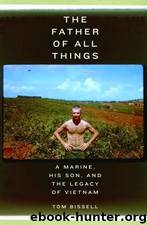The Father of All Things: A Marine, His Son, and the Legacy of Vietnam by Tom Bissell

Author:Tom Bissell
Language: eng
Format: mobi, epub
Tags: Travel, Essays & Travelogues
ISBN: 9780307523617
Publisher: Random House LLC
Published: 2009-03-25T00:00:00+00:00
IV
On our way to Chu Lai, the former site of a U.S. military base, the road was full of everything but traffic. Truong, consequently, was driving much faster than usual. This was not actually all that fast, since the Vietnamese do not seem to be much compelled by the theoretical ideal of speed. All the same, the road's chickens, dogs, cats, children, and rice farmers took several decisive steps away from the road moments before our car whizzed by. Even a few large, burdened cattle looked over, saw us coming, and plowed slowly head down toward the safety of the berm. It was early yet, the sun still turning from orange to white, the sky from pink to blue.
Soon enough we passed a martyrs’ cemetery, where NLF and PAVN dead were interred in endless white rows of small square tombstones. Hien translated the words emblazoned upon the cemetery's arched front gate: “The Fatherland Will Never Forget Their Sacrifice.” In many martyrs’ cemeteries a number of the dead had tombstones that read CHUA BIET TEN: “Not yet known.” During the war it had been fairly common for U.S. forces to bury enemy dead in large unmarked graves after relieving bodies of their diaries and letters, which sometimes contained useful intelligence. The particular cultural trauma of this practice was significant, for it effectively erased these fallen soldiers’ identities. In the Vietnamese belief system a body was needed to secure safe passage into the afterlife. Those Vietnamese whose bodies were never found or identified—a considerable number, given the soldiers vaporized by napalm alone—were referred to as “those for whom no incense was burned”; their ghosts wandered the earth, in the words of the Vietnamese writer Bao Ninh, “whispering as they floated around like pale vapors, shredded with bullet-holes.” I thought of the grief of the American families whose loved ones’ bodies were similarly never found. As in so many instances when it came to the war, the shared grief of those Americans and Vietnamese whose sons, husbands, fathers, and brothers had never been recovered was similar but not quite analogous. Not that this mattered. War italicized the differences between people just as it made the differences ultimately futile to consider.
I studied my father as we passed by the cemetery. “How did you feel about seeing that?” I asked him.
“I'm excited. I want to see it.”
“Not Chu Lai. The cemetery.”
He cast a quick backward glance through the rear window. “Oh. That.
I don't know. It's just a cemetery.” He lowered his voice and leaned in close to me. “You know, this morning at breakfast Hien astounded me. I said I wanted to try to find one particular place at the base and he said, ‘We'll have to ask the old people.’ I thought, ‘You little twerp. You have to ask the old people?’ I then realized that seventy percent of the population of Vietnam is under twenty-eight years of age. And Hien's … what, in his fifties? He was a kid during the war. He doesn't remember.
Download
The Father of All Things: A Marine, His Son, and the Legacy of Vietnam by Tom Bissell.epub
This site does not store any files on its server. We only index and link to content provided by other sites. Please contact the content providers to delete copyright contents if any and email us, we'll remove relevant links or contents immediately.
Endurance: Shackleton's Incredible Voyage by Alfred Lansing(3844)
Tokyo Vice: An American Reporter on the Police Beat in Japan by Jake Adelstein(3440)
The Motorcycle Diaries by Ernesto Che Guevara(3332)
Alive: The Story of the Andes Survivors by Piers Paul Read(3310)
Apollo 8 by Jeffrey Kluger(3199)
Exit West by Mohsin Hamid(3183)
Aleister Crowley: The Biography by Tobias Churton(3019)
Annapurna by Maurice Herzog(2839)
Full Circle by Michael Palin(2771)
Into Thin Air by Jon Krakauer(2701)
A Wilder Time by William E. Glassley(2363)
Kitchen confidential by Anthony Bourdain(2306)
In Patagonia by Bruce Chatwin(2269)
Finding Gobi by Dion Leonard(2259)
Into the Wild by Jon Krakauer(2124)
L'Appart by David Lebovitz(2119)
The Ogre by Doug Scott(2114)
The Stranger in the Woods by Michael Finkel(1923)
An Odyssey by Daniel Mendelsohn(1922)
